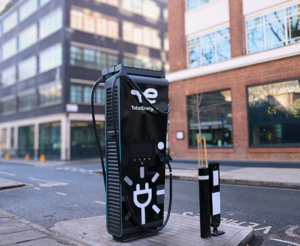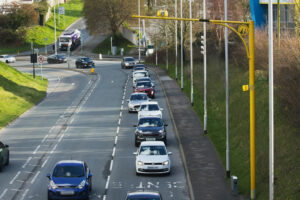Cheshire West and Chester Council is pausing the trial Emergency Active Travel lanes that have been in operation for the past five months in Chester, after listening to the recommendations from the independent Sustainable Transport Task Force that has been analysing their use.
The Council introduced two new trial Emergency Active Travel lanes in Chester as part of the Government’s ambitions to promote cycling, walking and public transport as healthy alternatives to using cars. This also followed the surge in enthusiasm for cycling during the COVID-19 pandemic, providing a shared facility with buses and taxis.
The lanes were established in October 2020 for an initial six-month period during which time the Council would listen to the opinions of road users, local business and residential communities.
In addition to roadside survey work and ongoing air quality monitoring the Council also established the independent Task Force to assist with Sustainable Transport across the borough including offering advice during the tranche one trial in Chester.
Councillor Karen Shore, Deputy Leader of the Council and Cabinet Member – Environment, Highways & Strategic Transport said: “We’ve been listening hard to the Taskforce and resident feedback and I’d like to thank everyone for their ongoing help and suggestions. The Council will be pausing the Experimental Emergency Active Travel Lanes in Chester on 1 March 2021.
“The Task Force considered the traffic volume data and engaged with a wide range of stakeholders. Walking and cycling increased along the A51 at weekends, but this evidence wasn’t sufficient to be able to draw any firm conclusions. They reported that there wasn’t enough data to confirm that safe cycling and walking had increased. The COVID-19 pandemic has resulted in lower than normal levels of overall travel which has added to the challenges of fully analysing the impact of the trial lanes.
“The Task Force believe that alternative options to increase cycling, walking, public transport and other sustainable transport are viable and necessary, and they have already commenced further research to review and develop options to adapt, extend or replace the current lanes. The findings of this further research will be presented to the Council for its consideration in due course.”
Consultation last summer for ‘Stronger Futures’ and ‘Walk, Ride Thrive’ gave a clear message from residents that there was a need for more active travel opportunities, reductions in speeding and tackling the climate emergency for a greener and sustainable future.
The trial lanes were in place to promote an increase in cycling and public transport. This has been an experimental process during which the Council has been listening and learning.
This doesn’t affect the engagement for Tranche 2 of the Active Travel funding that is listening to views of interested parties about the proposed new cycling and walking routes.
Councillor Shore added: “Reducing congestion on our roads, promoting environmentally friendly forms of transport, and improving air quality are still the goals in accordance with the recently approved Climate Emergency Response Plan with early results from the current e-scooters trial demonstrating an enthusiasm for alternatives to the car. The Council will therefore continue to work closely with the Sustainable Transport Taskforce to inform their ongoing consideration of alternative options to the trial Emergency Active Travel Lanes.”
























